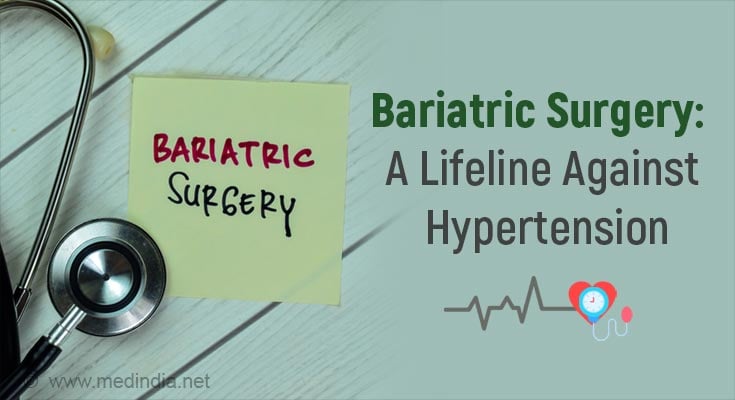- Bariatric surgery effectively lowers hypertension in obese patients
- Study shows significant BMI reduction and medication need post-surgery
- Need for further research on optimal obesity treatment pathways emphasized
Research indicates that bariatric surgery can aid in reducing hypertension rates or high blood pressure in individuals with obesity and hypertension.
As per a study recently published in the Journal of the American College of Cardiology, bariatric surgery proves to be more effective in managing hypertension rates, or high blood pressure, in individuals with obesity and uncontrolled hypertension compared to relying solely on blood pressure medication (1✔ ✔Trusted Source
Bariatric Surgery and Hypertension
).
The Superiority of Bariatric Surgery
Following five years, individuals who underwent bariatric surgery had a lower BMI and required fewer medications while maintaining normal blood pressure levels, in contrast to those who solely relied on anti-hypertensive drugs.
The CDC reports obesity and hypertension rates in adults in the U.S. at 41.9% and 45.4%, respectively.
Obesity is a known risk factor for cardiovascular diseases and significantly contributes to high blood pressure, both of which elevate the risk of heart attack, stroke, and heart failure.
Carlos Aurelio Schiavon, MD, FACS, the lead author of the study and a bariatric surgery specialist at Heart Hospital and BP Hospital in Sao Paulo, emphasized the often overlooked significance of addressing obesity in clinical practice to mitigate cardiovascular risk factors like hypertension.
Future Directions in Obesity Treatment
The study investigated the impact of treating obesity to reduce high blood pressure, acknowledging the challenges of long-term adherence to medication despite the availability of new obesity medications.
Bariatric surgery emerged as a more promising long-term solution for controlling obesity and consequently high blood pressure.
The GATEWAY trial involved 100 participants, predominantly female, with a BMI around 36.9 kg/m2 and hypertension requiring at least two medications. Those with prior cardiovascular events and poorly controlled Type 2 diabetes were excluded.
Advertisement
Participants were assigned either Roux-en-Y gastric bypass with medical therapy or medical therapy alone, with the primary goal being a reduction of at least 30% in antihypertensive medications while maintaining blood pressure levels below 140/90 mmHg at five years.
After five years, those who received bariatric surgery had a BMI of 28.01 kg/m2 compared to 36.40 kg/m2 for those on medical therapy alone. The bariatric surgery group experienced an 80.7% reduction in medication usage compared to a 13.7% reduction in the medical therapy-only group.
Advertisement
Hypertension remission, defined as controlled blood pressure without medications, was significantly higher in the bariatric surgery group (46.9%) compared to the medical therapy-only group (2.4%).
Schiavon emphasized the importance of addressing obesity to reduce hypertension rates based on the study’s findings. Limitations of the study included its single-center, open-label design, small sample size, and loss of follow-up in some patients.
In an accompanying editorial, Michael Hall, MD, MSc, from the University of Mississippi Medical Center, noted the study’s valuable long-term data on the benefits of gastric bypass on weight loss and blood pressure control. However, he stressed the need for further research to determine the optimal treatment pathways for obesity, including the threshold and timing for bariatric surgery and comparisons between different obesity treatments and bariatric surgery.
Reference:
- Bariatric Surgery and Hypertension – (https://www.ncbi.nlm.nih.gov/pmc/articles/PMC8467380/)
Source-Medindia



